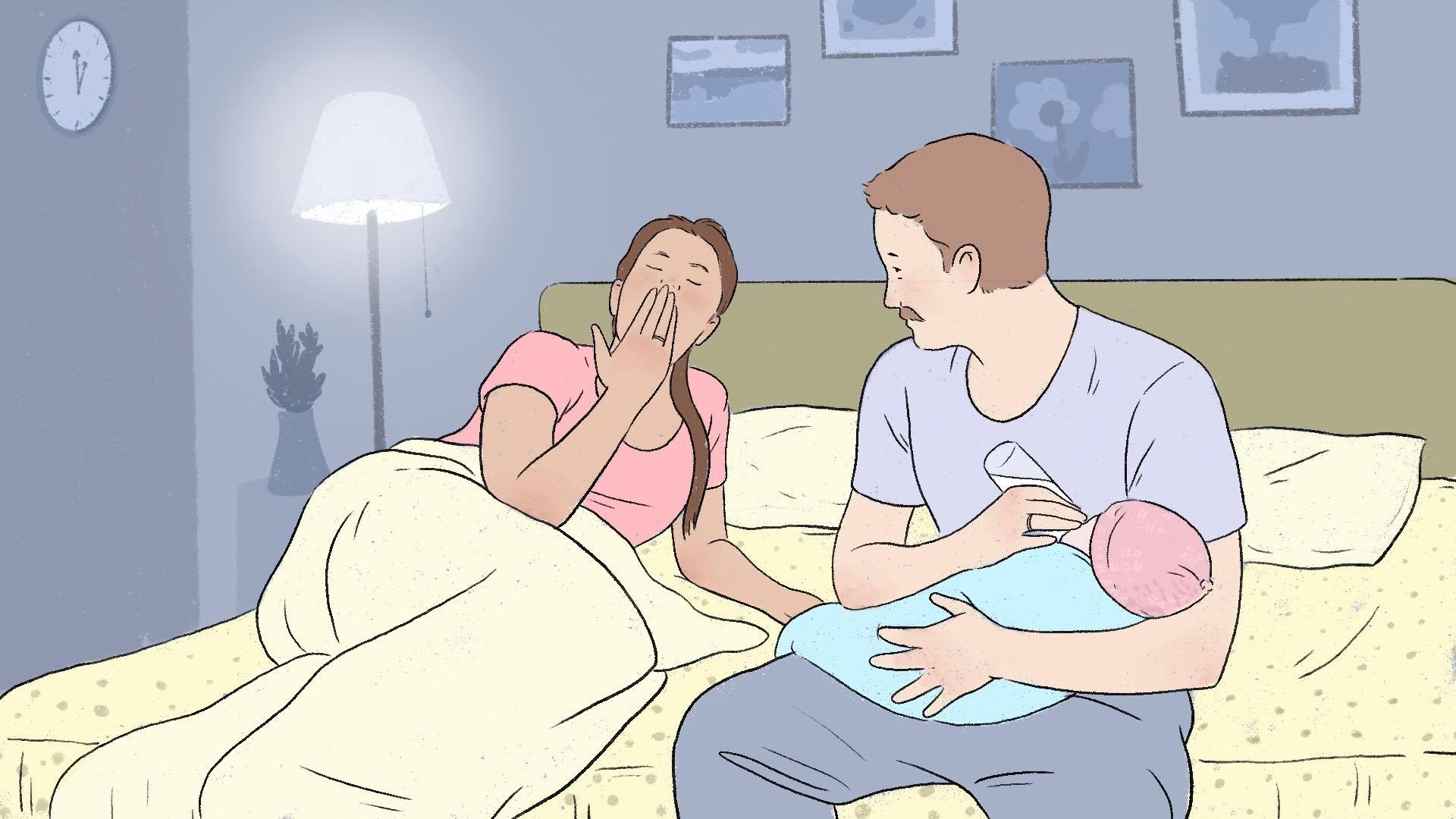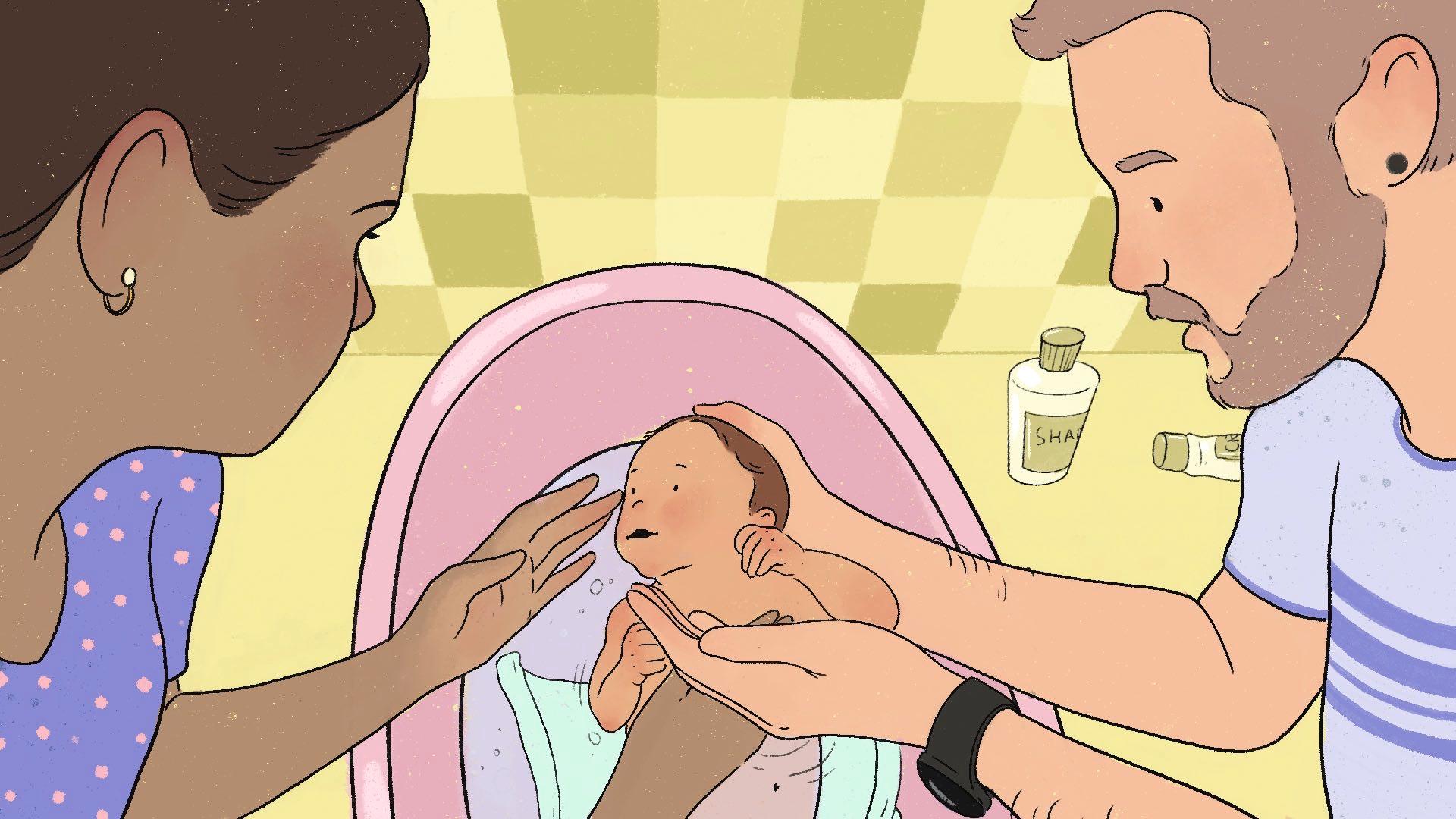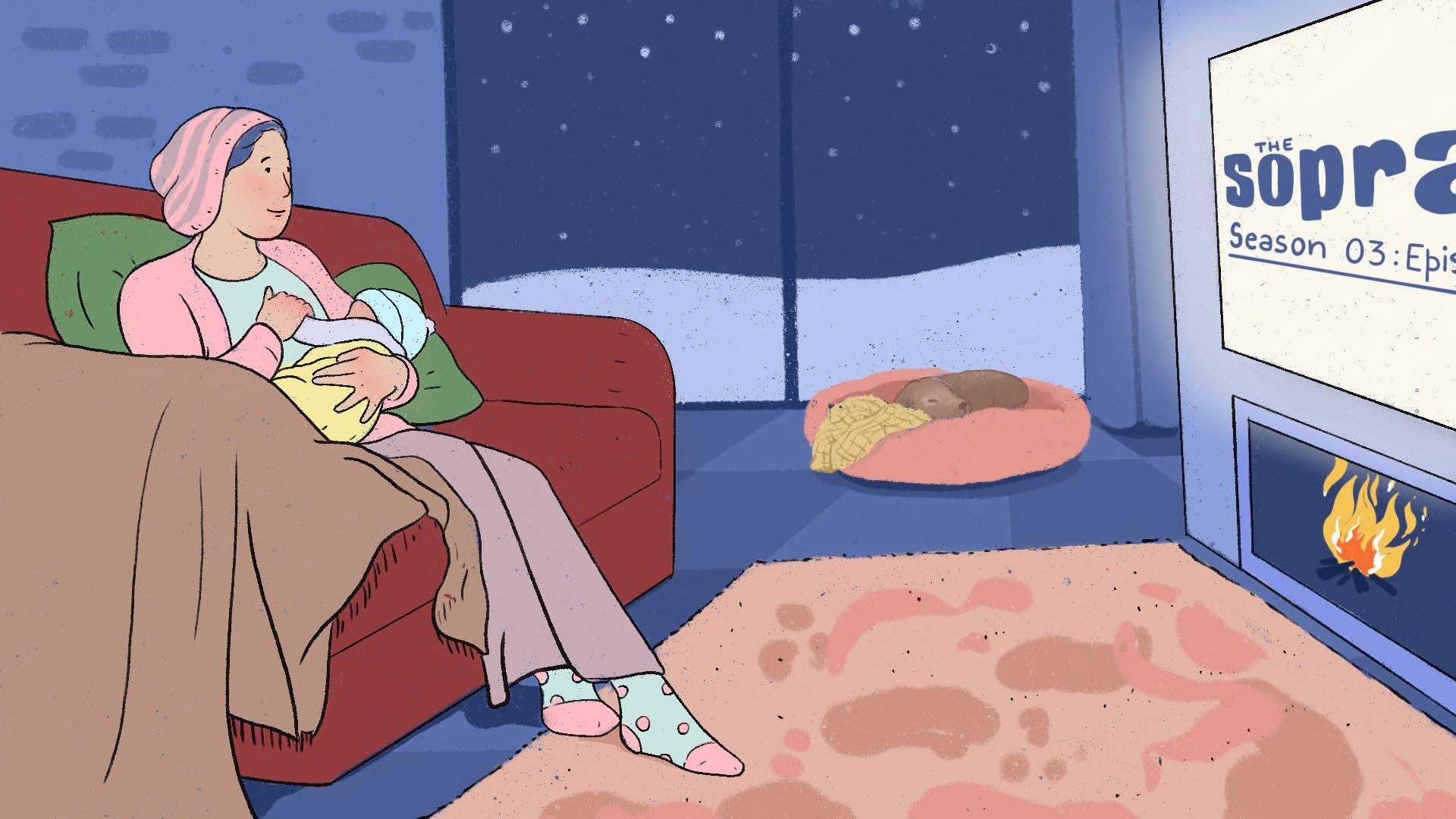Parenting
Your baby’s developmental milestones in year one
By Cradlewise Staff
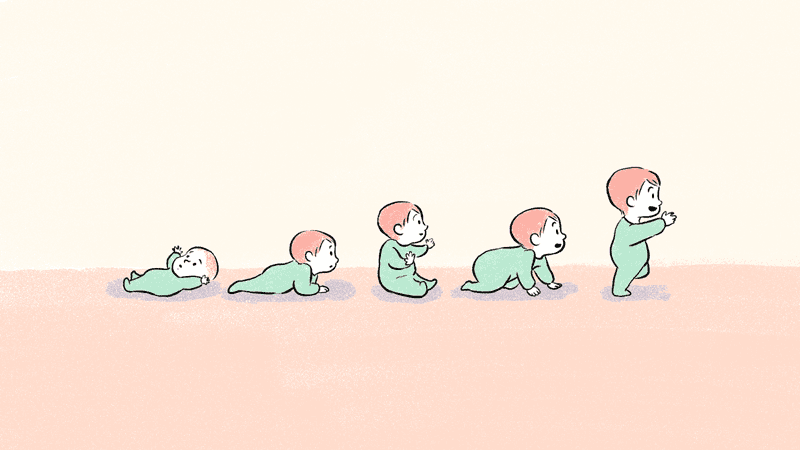
Parenting
Your baby’s developmental milestones in year one
By Cradlewise Staff
In the first year, your baby will grow at an astonishing pace — not just physically, but emotionally and mentally too. Watching your sweet, snuggly baby grow into a rambunctious, active toddler can feel like watching a home movie in fast-forward mode.
Every month, your little one will achieve a new developmental milestone. Below, we’ve covered what milestones are and how they help track your baby’s growth — and listed a few important ones to look forward to as your little one grows.
What are developmental milestones?
Skills such as rolling over, pulling up, grasping, waving, or self-feeding are known as developmental milestones. Pediatricians look at certain milestones to track your baby’s growth and development.
Each milestone that is learned or achieved by a specific age helps indicate that a child is healthy and developing on track.
But remember, there’s a wide range of what’s considered healthy when it comes to child development. Don’t worry if your baby hasn’t met a milestone by the “average” age you read in a book or online — every baby is different, and every baby grows at their own pace.
Plus, babies may reach a milestone faster or slower because they’re always simultaneously developing multiple milestones. Your pediatrician is the best person to consult if you have any doubts or concerns.
How milestones help track your baby’s growth
Your pediatrician will recommend a timeline for checkups during baby’s first year, usually six to seven visits in total, every three months after month two.
At your baby’s checkups, your pediatrician will ask questions and perform assessments to track your baby’s growth and development.
In addition to general health and physical wellness (plus any vaccinations your baby is due for), your pediatrician will check for:
- Motor skills
- Visual skills
- Language skills
- Social skills
Your baby’s big milestones in year one
Here’s what you can expect during your first year with baby. Keep your camera close at hand to capture these special firsts!
Visual and auditory milestones
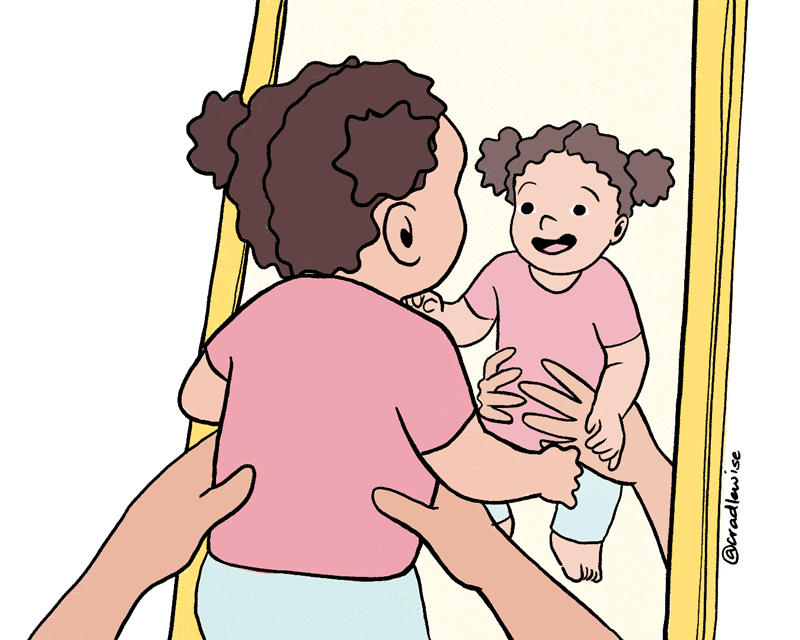
Your baby will start to recognize sights and sounds in their first month. Specifically, your one-month-old will:
- Recognize faces, especially yours
- React to sounds by showing alertness
By four months of age, your baby will react to your smiles and your voice. You’ll also notice your baby finding ways to actively seek your attention: your baby will look at you, move, or make sounds to keep you focused on them.
By six months, your little one knows familiar faces, like caregivers and grandparents. At this age, you may also notice your baby looking at their own reflection in the mirror, which shows their developing sense of self-recognition.
Your baby’s first smile
As a newborn (four weeks old), your baby might smile while asleep. These are called reflex smiles, which develop in the womb and indicate that your baby’s facial muscles are working normally.
Unfortunately, these aren’t real smiles of happiness. However, one significant two-month-old milestone is that your baby will start smiling for real. As your baby’s relationship with you grows and deepens, they will start smiling at you when they’re happy.
Your baby’s first laugh
Another significant two-month-old milestone is that your baby will start to coo and make sounds (other than crying).
Your baby will begin to chuckle by month four, but it’s not yet a true laugh. They will also make sounds like “oooh” and “aah” when you talk to them.
You can expect your little one to squeal and laugh fully by around their sixth month. They will also take turns with you to make funny sounds — which is pretty much the best game ever!
Your baby’s first sounds and words

Babies can be surprisingly vocal — even in their sleep, newborns do a lot of grunting and whimpering. But at first, your baby will communicate primarily through cries.
By the second month, however, your baby will make sounds other than crying in order to communicate with you. Those adorable coos are your baby’s first attempts at spoken language.
By around four months, you might notice your baby experimenting with different sounds, like ooohs, ahhhs, eees, and gurgles. And by nine months your baby will probably make their first attempts at word-like sounds, like “mamama” or “bababa.” They’ll also show signs that they recognize their own name!
Around month twelve, your baby might finally say “mama” and “dada,” although many babies take longer to form their first words — and that’s completely normal, too. By this age they can also understand words like “no” and also wave “bye-bye.”
Your baby’s movement milestones in year one
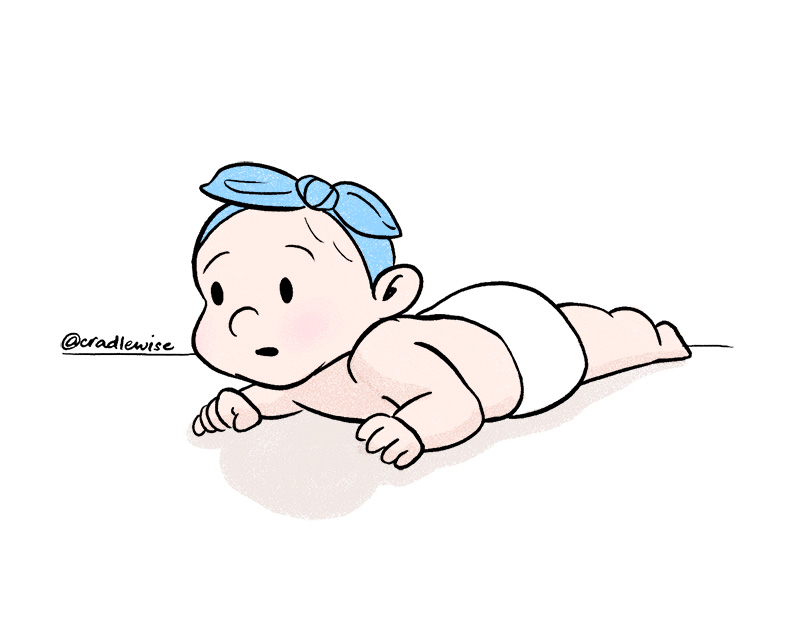
In month two, your baby will be able to hold up their head during tummy time and move both arms and legs. When they reach their fourth month, this will progress to:
- Holding their head up unsupported
- Pushing themselves up onto their forearms while on their stomachs
- Arm swinging and grasping toys
One major movement milestone happens during the sixth month: rolling over! Your baby might roll from their tummy to their back for the first time. They will also graduate from supporting themselves on their forearms to supporting themselves with straight arms.
At nine months old, not only will your baby be able to get into a sitting position unassisted, they’ll also sit comfortably without support. Other milestones during this period are:
- Moving things from one hand to another
- Raking food with their fingers to bring it closer
By a year old, your baby will be able to pull themselves up to a standing position and may even walk while holding your hand, the wall, or the couch for support. They will also start to grasp food with their thumb and forefinger and drink from a lidless cup (while you hold it).
Your baby’s cognitive development in year one

Over the course of the first year, you’ll notice actions that show your baby’s brain is developing. These skills, while they may seem small, are all exciting indications that your baby is developing learning, thinking, and problem-solving abilities.
For example:
- At two months old, your baby will begin to watch you and look at toys.
- They will show non-crying signs of hunger in month four like opening their mouth when they see a bottle or breasts.
- Serious exploration will begin in month six — this means they’ll want to put almost everything in their mouth! They will also start to close their mouth to indicate they are full.
By month nine, prepare yourself for a little noise, as baby will start to experiment with banging, shaking, and even throwing toys. Your little one will also begin to look for lost items, like a dropped spoon.
By month twelve, this understanding of out-of-sight objects will develop even more. Your baby will actively search for an item that you have hidden, like a toy in a box.
Your baby’s emotional and social development in year one
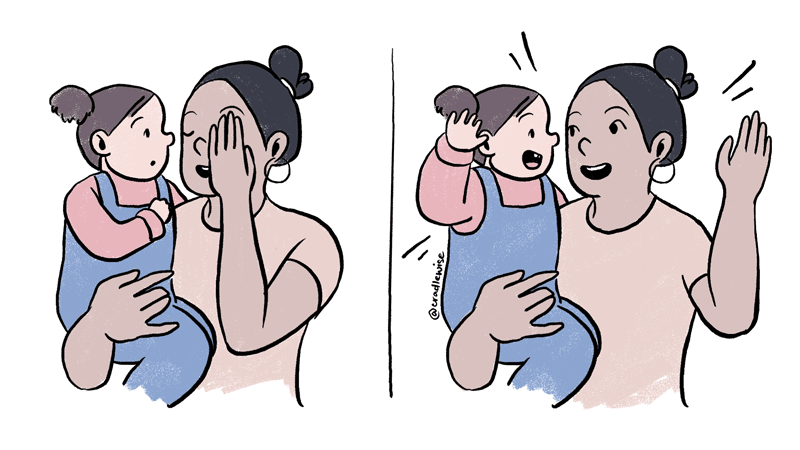
At first, your baby will be primarily interested in interacting with their favorite person: You! During the first few months, your baby’s social and emotional milestones will be all about interactions with their primary caregivers.
That means lots of smiling and looking at you, reacting to your voice and your smile, and making sounds to get your attention. You’re the center of your little one’s world — enjoy these sweet early social milestones, and know that it’s impossible to spoil a baby with too much attention.
Your baby’s social and emotional world begins to expand by month six, when they’ll show signs of familiarity with the people they see most often — family members, babysitters, and friends.
By nine months, you’ll see your baby expressing feelings of happiness, shyness, fear, and more through their actions and facial expressions. Happiness will be expressed through laughter and smiles, and sadness through looks, reaching gestures, and tears (especially when you leave them).
By the time your baby turns nine months old, they will also be interested in interactive play — peek-a-boo is a big hit with babies this age. And by month twelve, your baby will show signs of interest in simple social games like hide and seek, and finger games like pat-a-cake.
Parenting tips to help your little one grow
As a parent, you are your baby’s first teacher. Here are a few things you can do to help them develop:
- Talk to your little one. The soothing effect your voice has works wonders.
- Mimic the sounds your baby makes and add in a word or two. It’s a great introduction to language and learning to speak.
- Reading to your baby will help them learn sounds and language.
- Sing and play music to your baby because it helps with brain development.
- Create a sense of security and safety by cuddling your baby often.
- Take care of yourself, to take care of your baby.
Being a parent is hard work! Take time out of your day to make sure you’re emotionally, mentally, and physically supported. Spending time with your baby and being a loving and positive parent is easier when you feel good about yourself.
Sources:
- Developmental milestones. 2021. Cleveland Clinic. Well-Baby Care Visits & Developmental Milestones (Age 0-12m).
- Child development. CDC. Child development.
- Baby milestones by age. 2022. CDC. CDC’s developmental milestones.
You may also like

